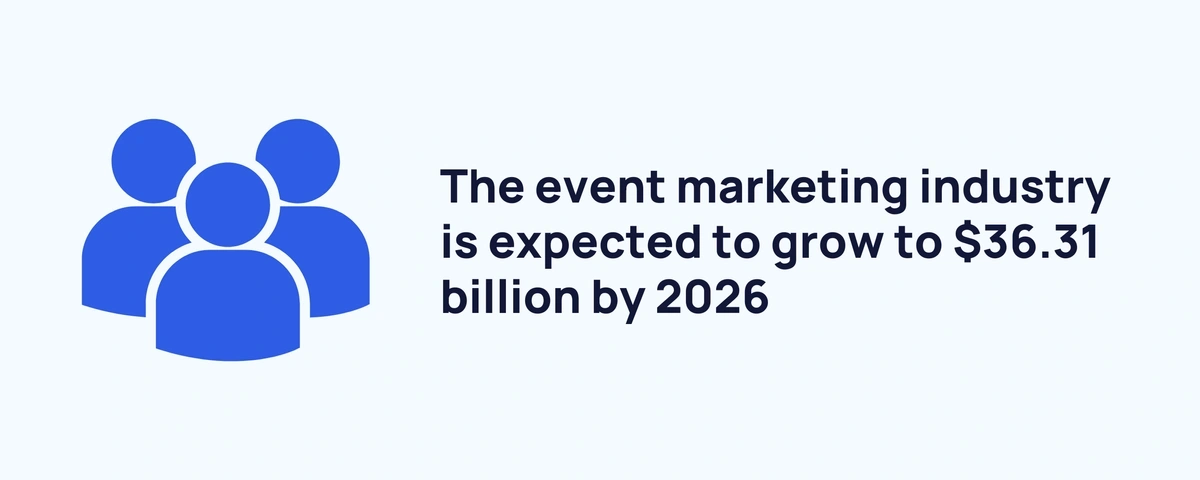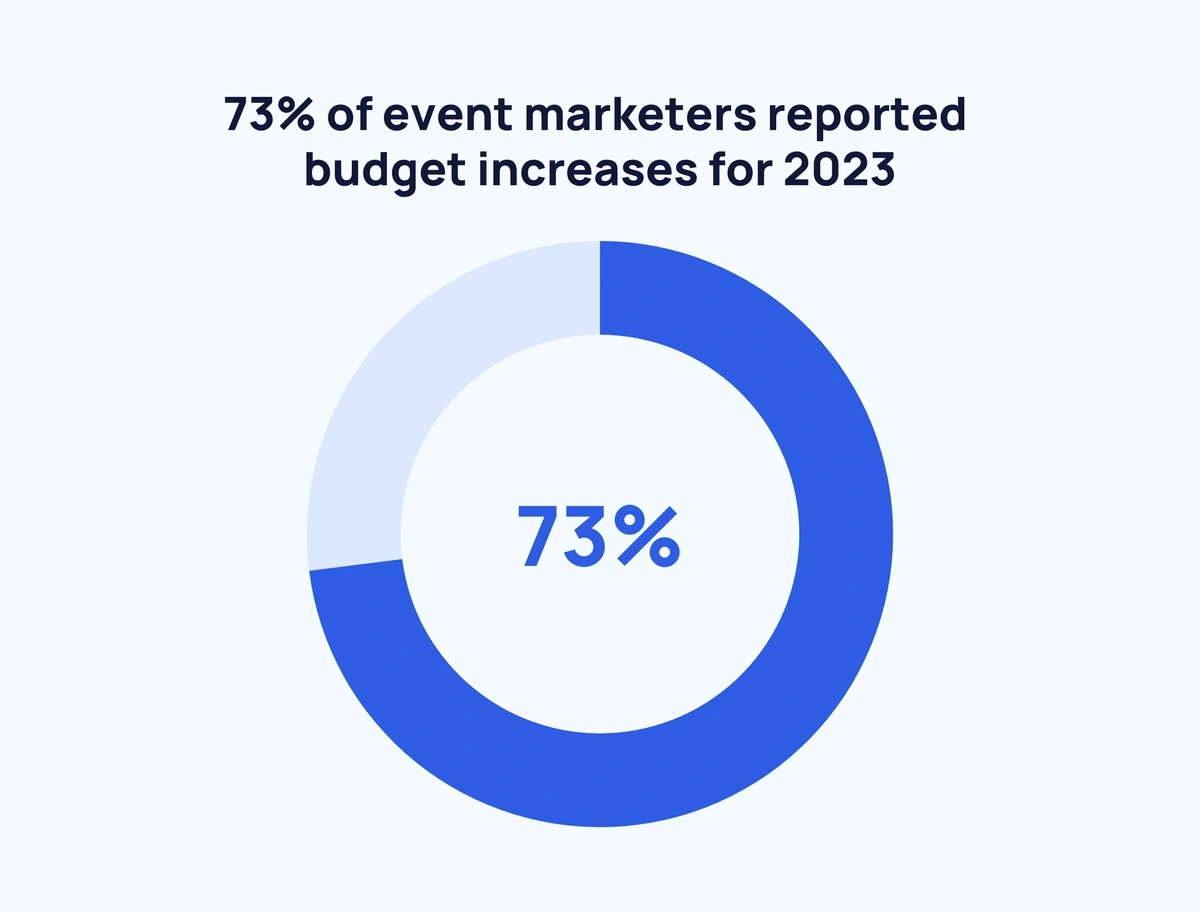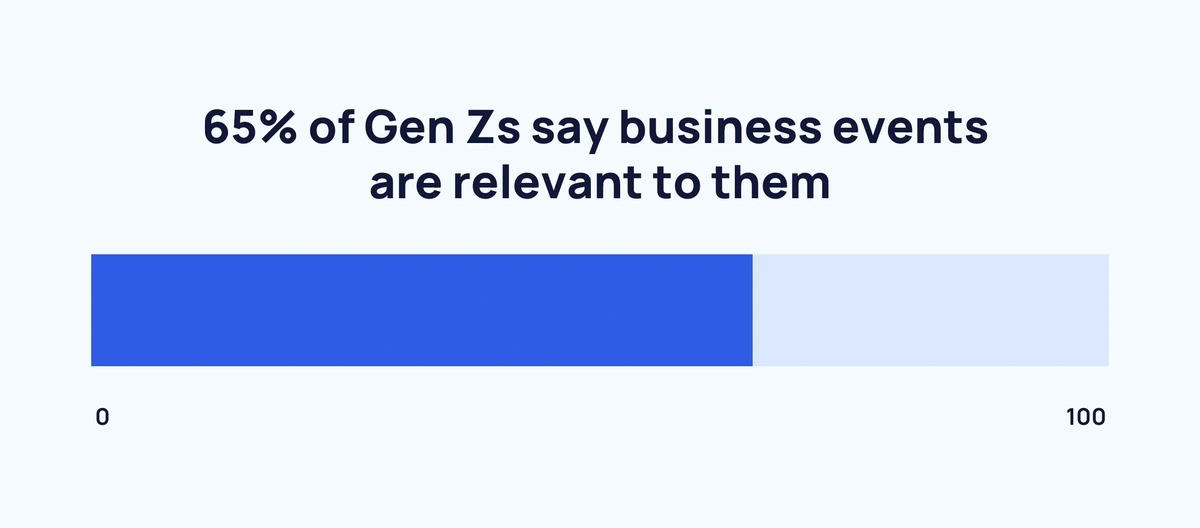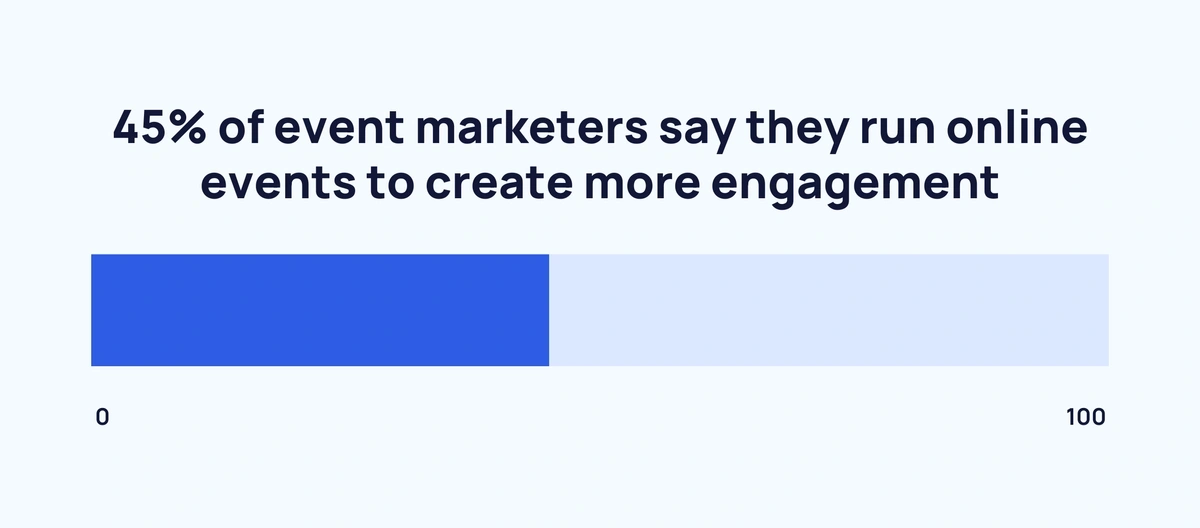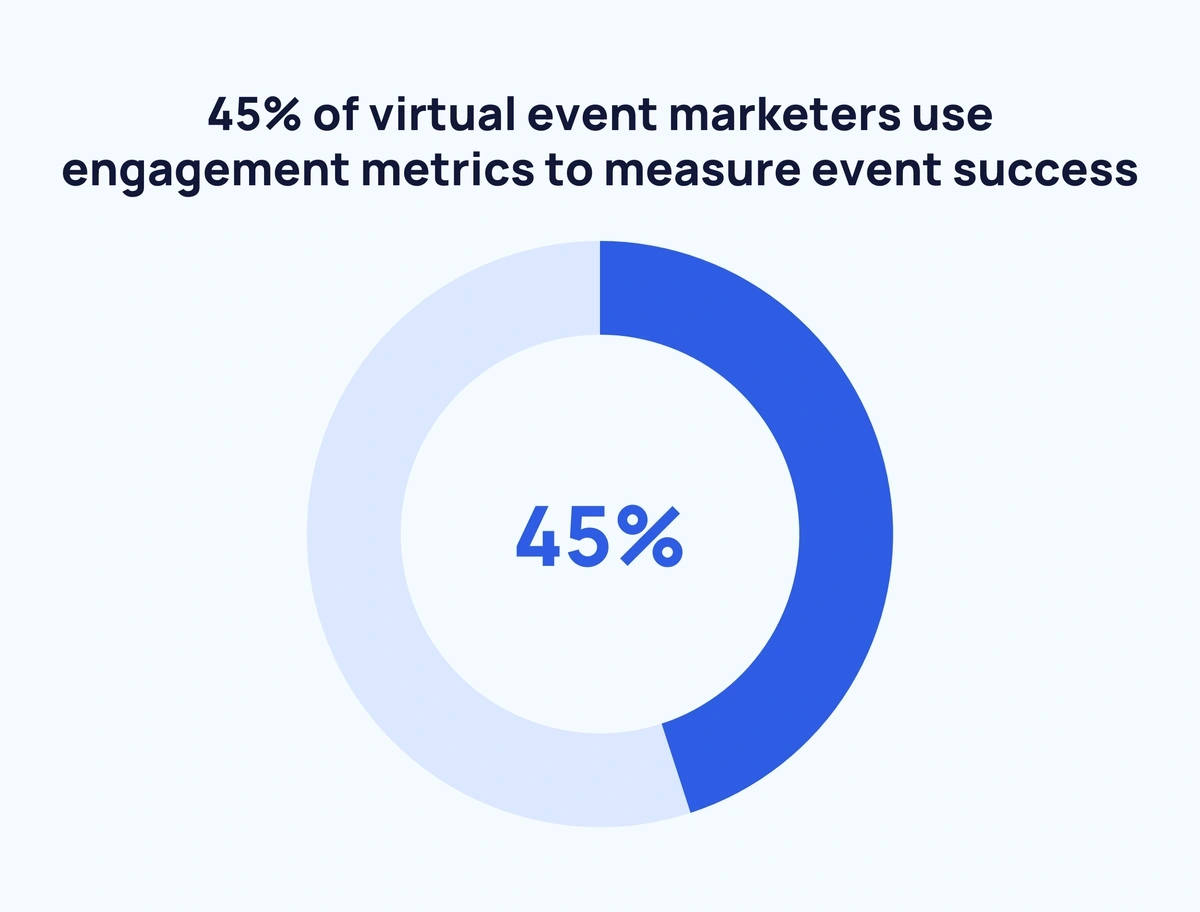Get Advanced Insights on Any Topic
Discover Trends 12+ Months Before Everyone Else
How We Find Trends Before They Take Off
Exploding Topics’ advanced algorithm monitors millions of unstructured data points to spot trends early on.

Keyword Research
Performance Tracking
Competitor Intelligence
Fix Your Site’s SEO Issues in 30 Seconds
Find technical issues blocking search visibility. Get prioritized, actionable fixes in seconds.
Powered by data from
50+ Event Marketing Statistics
For decades, event marketing was a surefire way to build brand awareness and secure new clients. Then a global pandemic came along and upended everything.
Event marketers had to pivot and innovate in the face of COVID-19. With physical attendance no longer an option, businesses turned to webinars and Zoom meetings. Today, event marketing is a robust ecosystem of in-person, virtual, and hybrid events.
In this collection of stats and trends, you’ll see how today’s event marketers combine new and old approaches to drive brand awareness, engagement, and sales.
Top Event Marketing Statistics
Before jumping into the full report, here’s a look at some of the top event marketing statistics for 2024 and beyond:
- The event marketing industry is expected to grow to $36.31 billion by 2026
- 90% of event organizers believe that all large-scale events will be remote or hybrid over the next two years
- 9 out of 10 B2B marketers believe that buyers are suffering from “event fatigue”
- 57% of attendees say they want to see more live streaming at events
- More than 9 in 10 event marketers believe their virtual and hybrid events have been successful
The State of Event Marketing
Despite recent challenges in hosting in-person events, the event marketing industry is stronger than ever. Market researchers predict some impressive growth in the space over the next several years. These stats reveal the state of event marketing from the perspective of businesses and marketers.
The event marketing industry is projected to reach $36.31 billion by 2026 (Daedal Research)
Daedal Research valued the event marketing industry at $13.87 billion in 2021 and expects the market to post a 12.96% CAGR between now and 2026.
B2B event marketing has the most significant share of the industry with 40%. B2C and mixed segments make up the rest of the market. The rise of virtual and hybrid events plays a large role in the industry’s projected growth.
90% of event organizers predicted that all large-scale events would be remote or hybrid in 2023 (Kaltura)
The industry consensus is that large-scale events are shifting to the digital space. There’s a shift in priorities, too: building new relationships is the top goal for in-person events while increasing brand awareness is the top goal for digital events.
9 out of 10 B2B marketers believe that buyers are suffering from “event fatigue” (MarketingCharts)
Half of B2B demand gen marketers say buyers are extremely fatigued by the number of online events they attend. Another 40% agree that buyers are fatigued, but only somewhat.
On average, marketers are most confident executing in-person events (MarketingCharts)
97% of marketers believe they’re effective at running in-person events, with 44% saying they’re “very effective.” Overall, marketers are far less confident in their ability to run other event types.
Only 12% believe they’re very effective at executing virtual events, with 79% claiming to be at least moderately effective. 8% are very effective at executing hybrid events and 14% are very effective at running webinars.
Increase in attendance is the top success metric for event planners (Emerald)
For marketing event planners, increased attendance is the number one success metric, followed by new accounts and higher attendee-to-exhibitor ratios.
For B2B vendors at events, the top three success metrics are new accounts engaged, quality of leads, and revenue generated on deals.
Lack of human resources is the top challenge for event marketers (Splash)
When asked to name their top challenges, 26% of event marketers mentioned lacking the right human resources to meet objectives. 23% pointed out budget constraints, while 20% said technology limitations held them back.
Other significant challenges include lack of training in event marketing best practices (11%), collaboration difficulties (8%), meeting stakeholder expectations (6%), and measuring results (5%).
Almost 3 in 4 event marketers reported budget increases for 2023 (Splash)
2023 was a big year for event marketing. 73% of marketers are increasing their event budgets — compared to just 38% in 2021 and 35% in 2022.
Only 10% of marketers say they’re decreasing their event marketing budgets in 2023, while 17% are keeping budgets around the same level.
47% of event marketers say that in-person events have the highest ROI (Splash)
In-person events are a proven money maker, which is why 83% of event marketers include them in their strategy. Sure enough, the majority of marketing conferences on our 2025 list have an in-person element.
Here’s a full breakdown of what kind of events marketers are executing:
- 43% run a mix of in-person and virtual events
- 30% only run in-person events
- 11% only run hybrid events
- 9% run a mix of in-person, hybrid, and virtual events
- 6% only run virtual events
Attracting the right attendees is the key to running a successful event (Splash)
When asked what the key to running a successful event was, 32% of even marketers said attracting the right attendees. 17% said attracting the most attendees, while 13% said creating compelling event content and accurately measuring ROI.
In-person events are the number one B2B marketing technique (LinkedIn)
B2B marketers have high hopes for event marketing. 60% plan to use in-person events in the next year. 49% plan to use digital events, and 39% say they’ll host hybrid events over that same period.
The majority of marketers using generative AI plan to leverage the technology for event marketing (LinkedIn)
Of marketers who currently use generative AI, 56% say they plan on increasing its use during in-person events. 48% of marketers said the same about digital and hybrid events.
Event Marketing Attendee Statistics
Events need to attract a certain number of attendees to be successful. What can marketers do to make their events more appealing? These stats explore the aspects of events that are most likely to keep attendees engaged.
Attendees gauge event success by the number of new business opportunities generated (Emerald)
B2B event attendees prioritize finding new business opportunities above all else. Other success metrics for attendees include an increase in community engagement and increased brand awareness.
57% of attendees say they want to see more live streaming at events (Emerald)
49% of event attendees want to be able to use live chat, and 39% want more on-demand content access. When asked what sort of content experiences they’d like to see, event attendees said:
- Webinars (62%)
- Meetups and networking opportunities (54%)
- Online roundtables (50%)
- In-person roundtables (46%)
- Podcasts (40%)
- Resource libraries (33%)
Around 2 in 3 Gen Zs say business events are relevant to them (Convene Digital)
Marketers hoping to tap into the Gen Z audience might fear that the demographic isn’t interested in events. A survey by Convene Digital found the opposite: nearly two-thirds of Gen Zs are open to business events.
A further 12% of Gen Zs said that business events could be relevant to them depending on the subject matter, the host, and how well organizers market the event.
Gen Z event attendees prioritize career and networking opportunities (Convene Digital)
When asked what aspect of business events were most interesting, 73% of Gen Zs said career and networking opportunities. Other top answers are workshops (57%), education (53%), travel opportunities (51%), professional development (51%), and speakers (51%).
Gen Zs want business events to be more engaging (Convene Digital)
What can marketers change to make events more appealing to Gen Z?
As many as 69% of Gen Z event attendees say they wish events were more engaging, 39% wish they were more inclusive, and 32% would like to see more communication between organizers and attendees.
Virtual & Hybrid Event Marketing Statistics
Throughout the pandemic, marketers had to learn new ways of executing events on the fly. But virtual and hybrid events weren’t just a temporary fix—they’ve become an industry standard. These stats show how marketers transform events into digital experiences.
Making physical and digital experiences equally good is the top perceived challenge for hybrid event marketers (MarketingCharts)
Perceived challenges can make marketers hesitant to try new approaches. For hybrid events, 49% of marketers believe making consistently good digital and physical experiences would be a top challenge.
Marketers also anticipate challenges around hybrid logistics (42%), convincing attendees to show up in person (36%), getting in-person attendees to engage digitally (35%), and a general lack of knowledge on how to run hybrid events (31%).
75% of attendees say they’ll keep attending virtual and hybrid events even after in-person events have fully resumed (Kaltura)
Attendees have bought into the virtual event experience. 93% of attendees agree that companies have done well at translating in-person meetings to digital spaces, and 73% are satisfied with their experiences at virtual events. 84% of attendees would like the option of attending events either in-person or remotely.
Almost half of event marketers say they run online events to create more engagement (AnyRoad)
What do marketers say when they have to pick one “why” behind their virtual event campaigns? Nearly half (45%) say increasing engagement, 19% say building brand awareness, and 14% say generating product sales.
Most event marketers run up to four virtual or hybrid events per month (AnyRoad)
Event marketers run anywhere from a handful to 20 or more virtual events every month. Here’s a recent breakdown based on a survey from AnyRoad:
- 51.8% run between 0-4
- 28.8% run between 5-10
- 9.9% run between 11-20
- 8.9% run 21 or more
Nearly half of virtual event marketers use engagement metrics to measure event success (AnyRoad)
24.9% use attendee satisfaction while 14.8% use revenue to measure the success of their virtual events. Only 7.9% use social media engagement numbers.
More than 9 in 10 event marketers believe their virtual and hybrid events have been successful (AnyRoad)
When rating themselves on how well they execute virtual events, 33.9% of marketers say they’re very successful. Another 58.2% say they’re somewhat successful. Only 1.6% of event marketers say they’ve been unsuccessful with virtual events.
Wrap Up
Eventgoers are enjoying the event industry’s new direction. In fact, the latest research shows that they want even more digital content options at events. As we move throughout the decade, events will continue to blend physical and digital experiences to better serve vendors and attendees.
Looking for more related statistics and trends? Check out Key Marketing Trends, Top Business Trends, and Emerging Event Industry Trends for 2024 and 2025.
Stop Guessing, Start Growing 🚀
Use real-time topic data to create content that resonates and brings results.
Exploding Topics is owned by Semrush. Our mission is to provide accurate data and expert insights on emerging trends. Unless otherwise noted, this page’s content was written by either an employee or a paid contractor of Semrush Inc.
Share
Newsletter Signup
By clicking “Subscribe” you agree to Semrush Privacy Policy and consent to Semrush using your contact data for newsletter purposes
Written By


Josh is the Co-Founder and CTO of Exploding Topics. Josh has led Exploding Topics product development from the first line of co... Read more




